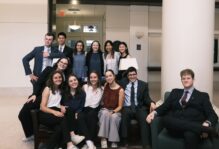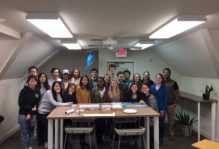Clashing Codes of Conduct: Asymmetric Ethics and the Biotech Revolution
Editors Note: The Project on International Peace and Security (PIPS) is one of the premier undergraduate think tanks in the country. Based at W&M’s Global Research Institute, PIPS is designed to bridge the gap between the academic and foreign policy communities in the area of undergraduate education.
PIPS research fellows identify emerging international security issues and develop original policy recommendations to address those challenges. Undergraduate fellows have the chance to work with practitioners in the military and intelligence communities, and they present their work to policy officials and scholars at a year-end symposium in Washington, DC.
Below are the summarized findings of PIPS Research Fellow, Caroline Duckworth who discusses her research on Ethics and the Biotech Revolution.
By Caroline Duckworth ’21
Asymmetric ethics, the variation between U.S. ethical standards and those of its peer competitors, puts the United States at a strategic disadvantage in biotechnology development relative to peer competitors. In the future, China and Russia will exploit asymmetric bioethics to outpace U.S. biotech development, seize market share, and rapidly develop controversial military technologies.
Societal values, culture, and differing political systems lead to different ethical standards and practices among countries. For example, the United States has extensive bioethical debates that stem from previous ethical failures, Judeo-Christian medical values, and an emphasis on individual rights. The nature of the U.S. political system also encourages extensive public debate about the development and use of new biotechnologies. These ethics and debates can hinder the rapid development of controversial biotechnologies.
China’s culture and political system produce different bioethics. China’s collectivist culture is more tolerant of individual sacrifice to benefit the public good. It’s political system also discourages debate and enables long-term, top-down down strategy. These characteristics allow biotechnology development to proceed more rapidly than in the United States by streamlining testing and creating clear development priorities. As a result, China has become a global leader in treatments like embryonic stem cell therapies, while the United States lags in this technology.
Asymmetric ethics already shape international biomedicine. U.S. patients travel abroad to seek controversial treatments (known as medical tourism) and U.S. pharmaceutical companies frequently test their products overseas to avoid expensive, domestic red tape (known as ethics dumping).
China’s ethical standards and focused investment create three risks for the United States. First, China could seize global market share and increase U.S. dependency on foreign bio-products, similar to Chinese dominating of the solar cell market. Beijing’s rapid development of biotech, enabled by its ethics and political structure, could result in Chinese control of market share in technologies like biopharmaceuticals and synthetic human organs.
Second, differing ethical standards could lead to Beijing and Moscow’s rapid development and adoption of controversial military capabilities, such as bioweapons and human enhancement technology. Advances in biotechnology will allow China and Russia to develop low cost, precise bioweapons that can target specific individuals or populations via their genetic codes. U.S. ethical standards and debate are likely to impede development in this field.
Third, new biotechnologies also could be used to enhance soldiers’ cognition, disease resistance, strength, and senses. Ethical and safety regulations in the United States will impede the adoption of such enhancements in the military. China and Russia may not confront such obstacles, increasing the likelihood that peer competitors will gain advantages over U.S. forces.
The United States should follow a three-step approach to maintain its lead in biotechnology and shape international bioethics. First, the United States should work through the Department of Defense (DoD) to formalize its guiding principles for ethical biotechnology development. This process should mirror the DoD’s effort to establish ethical principles for the development of artificial intelligence. Broadcasting U.S. ethical standards will help guide nations developing their own regulations, create global consensus on bioethics, and highlight violators.
Second, the United States should leverage its current lead in biotechnology and encourage others to operate on U.S. ethical terms. Thus, the United States can generate consensus on global bioethics through collaboration with nations of concern. This tactic could be implemented through the NIH’s U.S.-China Program for Biomedical Collaborative Research and will help create consensus on acceptable practices.
Finally, the Defense Advanced Research Projects Agency (DARPA) should task its Biological Technologies Office (BTO) to identify biotechnologies in which U.S. ethical standards will hinder development. Then, the DoD should strategically invest in competing, ethical technologies. This investment will allow U.S. biotechnology to compete while maintaining U.S. ethical standards.
By adopting this strategy, the United States will maintain its advantage in biotechnology and lead the creation of global bioethical norms.
Read Caroline Duckworth’s full findings in her white paper (pdf) or watch her video presentation.
For more information about the Project on International Peace & Security (PIPS) visit the GRI website.





No comments.
Comments are currently closed. Comments are closed on all posts older than one year, and for those in our archive.